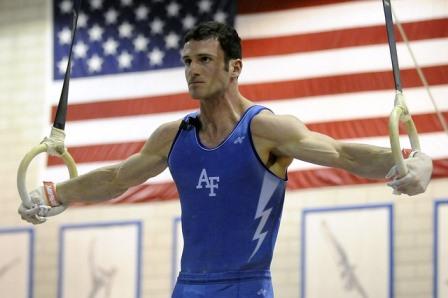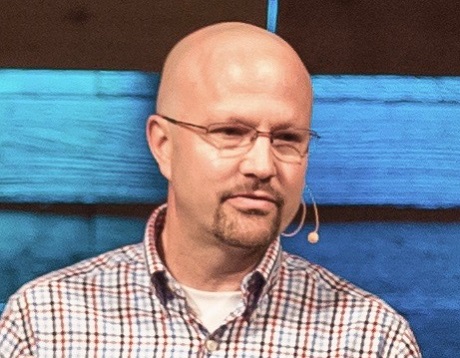- Calls to this hotline are currently being directed to Within Health or Eating Disorder Solutions
- Representatives are standing by 24/7 to help answer your questions
- All calls are confidential and HIPAA compliant
- There is no obligation or cost to call
- Eating Disorder Hope does not receive any commissions or fees dependent upon which provider you select
- Additional treatment providers are located on our directory or samhsa.gov
Male Athletes & Eating Disorders: When is it Time to Consider Treatment?

Travis Stewart, LPC, NCC – Director of Business Development and Marketing and Riley Nickols, Ph.D., CEDS McCallum Place
In recent years more male athletes have begun to talk openly about eating disorders and the impact that eating disorder behaviors have had on their relationships, sport performance, and mental and physical health. This is a welcome change and bodes well for other men (not just athletes) who may face the challenges of anorexia, bulimic or binging behaviors.
Historically, men with eating disorders are less likely to seek treatment. This is likely due to a number of barriers men face when it comes to getting help for eating disorders:
- Eating disorders are often perceived to be a “female issue” and stigma may keep men from asking for help
- Although this has been changing in recent years, many eating disorder treatment centers only admitted female patients
- Men may feel misunderstood and lonely if they are the only male in a group setting
- Eating disorder behaviors among men can be noticed with less frequency and lower concern than would be given to a woman using the same behaviors
When men do choose to seek treatment, there are often delays in doing so. In fact, studies show that in general, and not just in the case of eating disorders, men are less likely to seek out help for mental health issues. These realities make it important for friends, family, coaches, athletic trainers, strength and conditioning coaches, team doctors and teammates to pay attention to signs of eating disorders among male athletes and seek the appropriate care for those who need help.
Additionally, many people believe that eating disorders among male athletes are limited exclusively to sports like wrestling or other sports with weight classes (e.g., boxing). In fact, eating disorders among male athletes can, and do, occur in any sport including football, baseball, basketball or golf.
Some male athletes will be helped in an outpatient setting for eating disorder behaviors while others need a higher level of care in order to recover and return to their sport. In order to do this one must recognize the warning signs of an eating disorder among athletes, regardless of gender. These include, but are not limited to:
- Excessive exercise
- Poor body image, preoccupation/focus on weight and shape
- Body checking, inspection, critical self-evaluation
- Changes in body shape/weight/mood
- Inability to take rest days without feeling guilty
- Injuries
- Isolation from others
- Performance decrements in school/work
- Rigid food rules, eating beliefs, rituals around eating
- Acute signs: Fainting, dizziness, and dehydration

- Weight loss to below 85% of expected/goal weight
- Caloric intake is low, and patient continues to resist increasing caloric intake
- Symptoms are worsening over time
- Continues to engage in exercise despite injury and/or that exceeds treatment team’s recommendations
- Psychological problems (e.g., depression, anxiety, obsessional thinking) that interfere with general functioning (i.e., school, work, social)
- Medical complications (bradycardia, EKG changes, electrolyte abnormalities, syncope)
- Poor progress in outpatient setting
Without treatment, an athlete can become isolated, and recovery from an eating disorder is unlikely. Over time, the physical and mental state of the athlete will deteriorate, negatively affecting their health and performance.
Poor athletic performance will likely result in more eating disorder behaviors and will increase the risk of serious metabolic injuries such as:
- fluid and electrolyte imbalances
- impaired concentration and judgment
- brittle bones and injuries to the musculoskeletal system
- heart damage or failure
These risks not only impact health and athletic performance but can be potentially life-threatening.
Why Athletes with Eating Disorders Need to be in Treatment

In a highly competitive environment, this may likely increase the pressure to perform for the athlete and creates a dependence on eating disorder behaviors in an attempt to improve performance and relieve stress.
Initially the performance may improve, but eventually, the eating disorder behaviors will have dangerous and potentially deadly outcomes. Without intervention and appropriate treatment, the athlete will not recover.
About the Sponsor:
McCallum Place is a nationally recognized eating disorder treatment center where professionals can help guide you through the process of treatment and recovery every step of the way.
About the Authors:
Riley Nickols, Ph.D., CEDS

Travis Stewart, LPC, NCC, MATS – Director of Marketing & Business Development at McCallum Place Eating Disorder Centers
Travis Stewart, LPC, NCC, MATS, is the Director of Marketing & Business Development at McCallum Place Eating Disorder Centers. He has worked in the field of eating disorders since 2003 in both clinical and marketing roles at every level of care. He brings a unique blend of clinical expertise and communication skills to his role with McCallum Place. He is passionate about connecting people to resources and experiences that are transformative and healing.
Travis graduated from the University of Nebraska in 1991 with a degree in advertising and immediately began working with the international ministry of The Navigators, mentoring students. After eight years, his desire to better understand how people change and heal led to obtaining a Master of Arts in Counseling (2001) and a Master of Arts in Theological Studies (2003) from Covenant Seminary in St. Louis, Missouri, where he now lives with his family.
The opinions and views of our guest contributors are shared to provide a broad perspective of eating disorders. These are not necessarily the views of Eating Disorder Hope but an effort to offer a discussion of various issues by different concerned individuals.
We at Eating Disorder Hope understand that eating disorders result from a combination of environmental and genetic factors. If you or a loved one are suffering from an eating disorder, please know that there is hope for you, and seek immediate professional help.
Published on April 29, 2019.
Reviewed & Approved on April 12, 2024, by Baxter Ekern, MBA
Published on EatingDisorderHope.com

